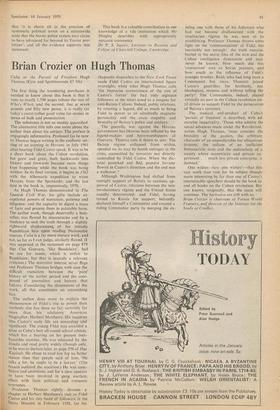Brian Crozier on Hugh Thomas
The first thing the wondering purchaser is entitled to know about. this book is that it runs to nearYy 1,700 pages (about the size of Who's Who); and the second, that at seven pounds and fifty new pence, it is really (at today's costs) rather good value for money in terms of bulk and presentation.
The substance is not so readily quantified. The alternative title tells one more about the author than about his subject. The preface is engagingly informative. Professor (as he now is) Thomas began writing in the euphoric set- ting of an evening in Havana in July 1961 after hearing Fidel Castro speak. It was to be a short book about the Cuban revolution, but grew and grew, both backwards into history and forwards because more things kept happening while the book was being written. In its final version, it begins in 1762 with the Albemarle expedition to wrest Havana from the Spaniards; and the last date in the book is, impressively, 1970.
As Hugh Thomas demonstrated in The Spanish Civil War, his gifts include ex- ceptional powers of narration; patience and diligence; and the capacity to digest a mass of facts and present them in palatable form. The earlier work, though deservedly a best- seller, was flawed by inaccuracies and by a tendency to seek the truth through a slightly rightward displacement of his initially Republican bias upon reading Nationalist sources. Cuba is a far more mature work, and not, so far as I can judge, similarly flawed. (I was surprised at the statement on page 879 that Che Guevara, 'like Baudelaire', had no -ear for music, which is unfair to Baudelaire; but that is scarcely a relevant criticism.) The narrative interest never flags and Professor Thomas bridges with ease the difficult transition between the 'pure' history of the earlier period and the com- pound of journalism and history that follows. Considering the dimensions of the work, all this constitutes an astonishing feat.
The author does more to explain the phenomenon of Fidel's rise to power than anybody else has done so far:, certainly far more than his adulatory American biographer, Herbert Matthews. His inquiries Into Castro's early life are rewarding and significant. The young Fidel was awarded a prize as Cuba's best all-round school athlete, which has a bearing on his present inex- haustible stamina. He was educated by the Jesuits and read pretty widely (though only. as he was to declare later, to page 370 of Das Kapital). He chose to read law for no better reason than that people said of him, 'He talks a lot, he ought to be a lawyer.' (The reason outlived the vocation.) He was com- bative and ambitious, and for a time appears to have been involved in gang warfare, albeit with faint political and romantic overtones.
Professor Thomas rightly devotes a Chapter to Herbert Matthews's visit to Fidel Castro and his tiny band of followers in the Sierra Macstra in February 1958, for his rhapsodic dispatches to the New York Times made Fidel Castro an international figure overnight; while what Hugh Thomas calls 'the imprecise overestimate of the size of Castro's forces' (he had only eighteen followers at the time) acted as a magnet for anti-Batista Cubans. Indeed, public relations, by creating a legend, did as much to bring Fidel to power as an admittedly magnetic personality and the crass stupidity and brutality of Batista's police and soldiery.
The guerrilla war against the Havana government has likewise been inflated by the legend-makers and hero-worshippers - of Guevara. Thomas cuts it down to size. The Batista regime collapsed from within, speeded on its way by bomb outrages in the cities, committed by terrorists not directly controlled by Fidel Castro. When the dic- tator panicked and fled, popular fervour flowed in Castro's direction and the end was a walkover.
Although Washington had shifted from outright support of Batista to cautious ap- proval of Castro, relations between the new revolutionary regime and the United States rapidly deteriorated; and Fidel, having turned to Russia for support, belatedly declared himself a Communist and created a ruling Communist party by merging the ex- isting one with those of his followers who had not become disillusioned with the totalitarian regime he was seen to be establishing. Professor Thomas throws some light on the 'communisation' of Fidel, but inevitably not enough : the truth remains buried in the secret files of the KGB and the Cuban intelligence directorate and may never be known. How much did this 'conversion' owe to Soviet pressure, and how much to the influence of Fidel's younger brother, Raul, who had long been a
Communist but (says Thomas) joined Castro's guerrillas for brotherly, not ideological, reasons and without telling the party? The Communists, indeed, played virtually no part in the Cuban revolution un- til driven to support Fidel by the persecution of Batista's torturers.
The ironical end-product of Cuba's 'pursuit of freedom' is described, with ad- mirable impartiality. 'Those who admire the social advances made under the Revolution,' writes Hugh Thomas, 'must consider the brutality of the gaolers, the arbitrary character of an unpredictable but ubiquitous tyranny, the tedium of an inefficient bureaucratic state and the melancholy of a society where eccentricity and private ex- periment . . . much less private enterprise, is damned.'
One wishes—how one wishes!—that this vast work (too vast for its subject though more interesting by far than one of Castro's interminable speeches) should be the book to end all books on the Cuban revolution. But one knows, resignedly, that the spate will continue. The barheidos are still with us. Brian Crozier is chairman of Forum World Features, and director of the Institute for the Study of Conflict.










































 Previous page
Previous page